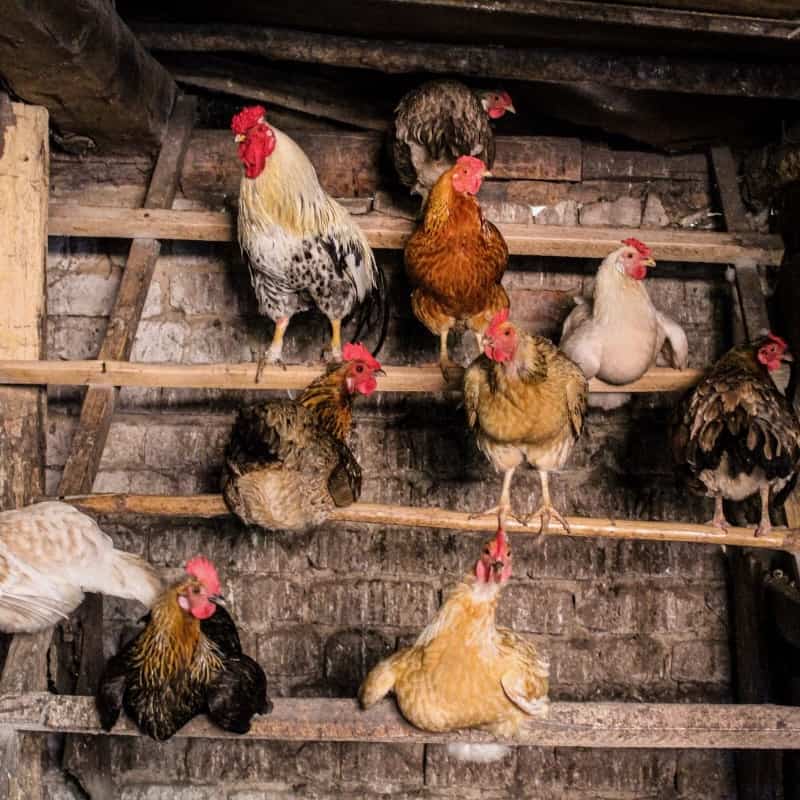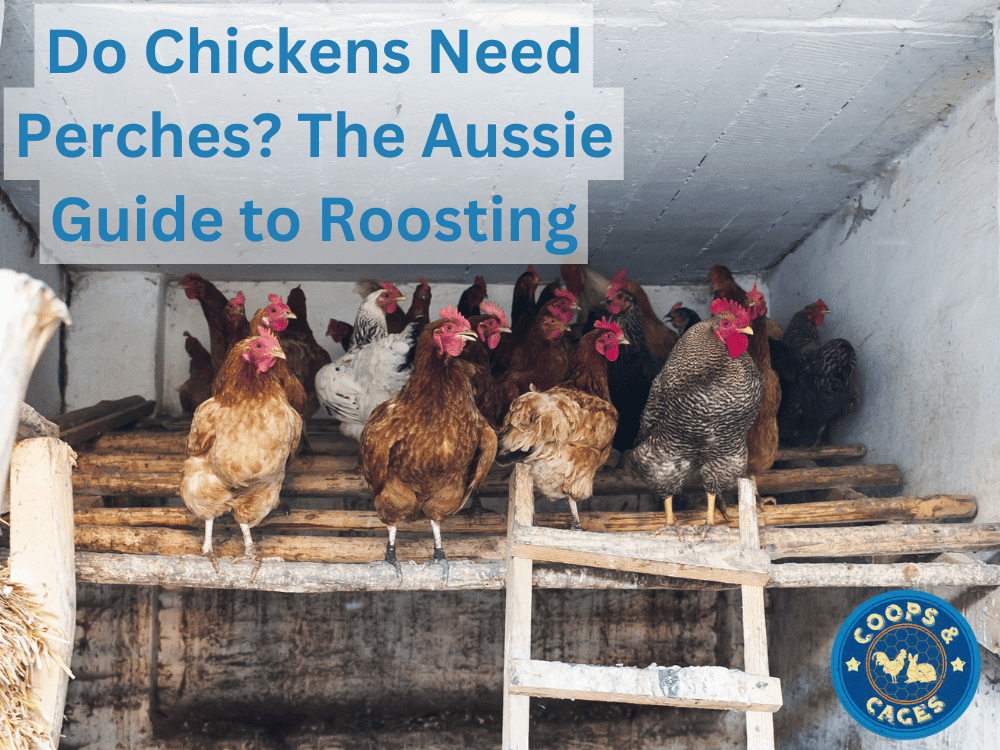Chickens, FAQ's, How To Do Things
Do Chickens Need Perches? The Aussie Guide to Roosting
Ever stared at a flock of chooks in the backyard and wondered, do chickens need perches? Or perhaps you’ve asked yourself why your feathered mates seem to have an obsession with those high spots?
In this blog post, we’ll unravel these intriguing chicken behaviours. You’ll understand why laying hens love their roosting bars as well as go through some chicken roost ideas for creating that perfect perch for your clucky pals!
So stick around as we flap into this feathery world together, and let’s discover the answer to the question ‘Do chickens need perches?’
The Importance of Perches for Chickens
Chickens have a natural desire to perch in trees for protection from danger and a lookout point. In the wild, birds roost in trees to stay safe from predators and keep an eye open for any threats. It’s no different with your backyard flock.
Your chooks have a deep-rooted instinct to find higher spots when they rest. That’s where chicken roosts come into play. Providing a good roost that replicates tree branches allows your hens to satisfy this inherent desire.
This behaviour is not just about safety though – it also helps prevent pecking order problems within the flock. A well-placed roosting perch lets dominant hens claim higher roosts while less assertive ones can settle on lower levels.
A sturdy chicken perch also plays an essential role in egg laying by offering hens a sanitary place off the ground keeping their nesting boxes clean.

Ideal Perch Characteristics and Placement
Creating an ideal perch for chickens involves considering both the characteristics of the perch and its placement within the coop. Here are some guidelines:
Perch Characteristics:
Material: Use natural materials like wood for perches, as they provide a comfortable and non-slip surface. Avoid metal or plastic, as they can become too hot or too cold.
Diameter: Aim for a perch diameter of about 5-10 cm. This allows the chicken to comfortably grip the perch without straining their feet.
Shape: A slightly oval shape or rounded corners are preferable, as it mimics the natural shape of a tree branch. Avoid bumpy perches or sharp edges that could cause injuries.
Perch Placement:
Elevation: Place perches at varying heights. Hens prefer to roost at higher elevations for safety from predators.
Spacing: Ensure enough space between each chicken roost to prevent overcrowding. A general guideline is to leave at least 20-25 cm of space between parallel perches.
Easy Access: Chickens should be able to access perches easily without obstructions. Ensure that there are no obstacles that might prevent them from reaching their roosts.
Cleaning: Position perches in a way that makes cleaning the coop easy. Consider designs that allow droppings to fall below the perches for straightforward clean-up.
Positioning: Keep perches away from nesting boxes. I have found this helps discourage chickens from sleeping in the nesting boxes, keeping them cleaner for egg-laying.
Remember that chickens have natural instincts, and providing a comfortable and secure roosting environment contributes to their well-being. Regularly inspect perches for wear and tear, and replace them if needed to maintain a safe and comfortable roosting space for your chickens.
Benefits of Elevated Perches
Elevated perches not only give your chickens a sense of security but also help them exercise their flying skills. Hopping onto higher roosts can strengthen their wings, which is especially important during winter months when they are less active outdoors.
A well-placed perch also helps maintain peace among the flock. The ‘pecking order’ isn’t just about food; it’s about prime real estate on the perch too. Studies conclude that dominant hens often claim the top spot while subordinates settle lower down.
Mindfully designed chicken coops consider these behaviours and provide varying heights of chicken roosts for different members of your mixed flock.
An appropriate perch design doesn’t just cater to social hierarchy or satisfy natural instincts; it plays a crucial role in promoting healthy egg laying as well. A good night’s sleep on a comfortable elevated spot ensures your hens wake up refreshed ready to lay eggs.

The Role of Perches in the Pecking Order
Just like wild birds, chickens have a ‘pecking order’. This is their social hierarchy. The perch plays a big role in this system.
Hens higher up the pecking order roost on higher spots on the perch. They prefer these elevated positions as they feel safer from predators and can keep an eye open for potential threats during sleep.
If you spot chickens snoozing on lower perches or even the floor, it may not be due to lack of space but more likely a consequence of issues with pecking order within your flock.
Popular Australian brands like Coops and Cages, and Somerzby offer plenty of coop designs with well-designed roosting perches, catering perfectly for all kinds of flocks.
Ensuring Safety and Security with Proper Perch Placement
Getting the perch placement right in your chicken coop is crucial for your chickens’ safety and security. Chickens roost higher to avoid predators, but this can lead to pecking order problems if not managed correctly.
The ideal height for a perch is at least 45cm from the ground. This lets your hens feel secure while also being accessible even for lighter breeds or arthritic hens. The ‘pecking order’ dictates that dominant birds will claim higher spots, so consider multiple levels of perches.
Avoid placing roosts directly above feeders or waterers to keep these areas sanitary. Importantly, make sure the perches are positioned higher than nesting boxes; otherwise, you might find that chickens sleep in their nest box rather than on their perch.
Studies conclude, that poorly placed or too high roosts could result in keel bone damage due to heavy landings after flight. Also, ensure there’s ample space between each bird (at least 5-10 cm) on the bar which helps mitigate any potential pecking order issues among them.
FAQs in Relation to Do Chickens Need Perches
Do Chickens Prefer To Sleep On Perches?
Absolutely. Chickens love sleeping on perches because it makes them feel safe, mimicking their wild ancestors who roosted in trees.
Do Chickens Need A Roosting Bar?
Yes, they do. A roosting bar or roosting perch gives your chooks a comfy spot to snooze and helps keep them off the cold ground at night.
Do Chickens Prefer Round Or Flat Perches?
Chickens generally prefer rounded perches about 50mm thick as these mimic the branches of trees and make it easier for them to grip and balance on comfortably.
Do Nesting Boxes Need A Perch?
You don’t necessarily need a perch for nesting boxes. But if you have one outside of each box, it can help hens access the nests more easily.
Jordan’s Wrap
In wrapping up our journey through ‘Do Chickens Need Perches?’ one thing is clear: roosting perches matter. From height to spacing, we’ve learned the key elements of a happy roosting spot for our feathery friends.
So, whether you’re managing a bustling coop or a cosy backyard flock, the answer is a definite yes – chickens need perches. These simple additions contribute to their well-being and daily joy.
As we conclude, let’s commit to being thoughtful caretakers, ensuring our chickens have comfy perches that cater to their natural instincts.



